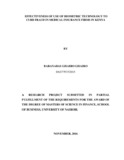| dc.contributor.author | Gisairo, Baranabas G | |
| dc.date.accessioned | 2016-12-23T06:50:12Z | |
| dc.date.available | 2016-12-23T06:50:12Z | |
| dc.date.issued | 2016-11 | |
| dc.identifier.uri | http://hdl.handle.net/11295/98395 | |
| dc.description.abstract | It is a common consensus that in the recent past there has been a tremendous growth in
the number and value of cases reported involving fraud especially in insurance industry.
Medical and Motor insurance business segments – the mainstay of the insurance industry,
are said to be making loses as a result of increased fraud cases. AKI 2010 report found
that the health insurance sector made the highest loss percentage of 81.5% followed by
motor private insurance at 74.9%. This study had an objective of establishing the
relationship between biometric technology and fraud in medical insurance firms. Data
from year 2013 to 2015 was collected from 18 insurance companies that underwrite
medical insurance business. The study adopted descriptive survey and data from
insurance firms was collected by administering of a questionnaire. Data on value of fraud
cases was collected from Insurance Fraud Investigation Unit. The study findings indicate
that the value of reported fraud cases significantly increases with the value of claims
authenticated via biometric technology. The main conclusion was that biometric
technology has not had a negative impact in curbing fraud in medical insurance
companies especially on claims submitted. The reason behind this is that as technology
develops fraudster tactics become more advanced and complicated which has seen a rise
in other forms of fraud like; cyber fraud, money laundering and internal fraud which
cannot be prevented by use of biometric technology. However, it was found that
biometric technology has really enhanced service delivery within the medical insurance
sector especially by way of managing member benefits this can be shown from the model
where there is a negative relationship between fraud cases and gross written premiums
from members enrolled on biometric technology. The researcher therefore recommends
that insurance companies to strengthen their internal control systems, improve corporate
governance structures and ensure that they have internal and external audit functions as
these are the key functions that can contain the fraud risk. The researcher also
recommends a same type of study to be carried out in commercial banks. | en_US |
| dc.language.iso | en | en_US |
| dc.publisher | University of Nairobi | en_US |
| dc.rights | Attribution-NonCommercial-NoDerivs 3.0 United States | * |
| dc.rights.uri | http://creativecommons.org/licenses/by-nc-nd/3.0/us/ | * |
| dc.title | Effectiveness of use of biometric technology to curb fraud in medical insurance firms in Kenya | en_US |
| dc.type | Thesis | en_US |



